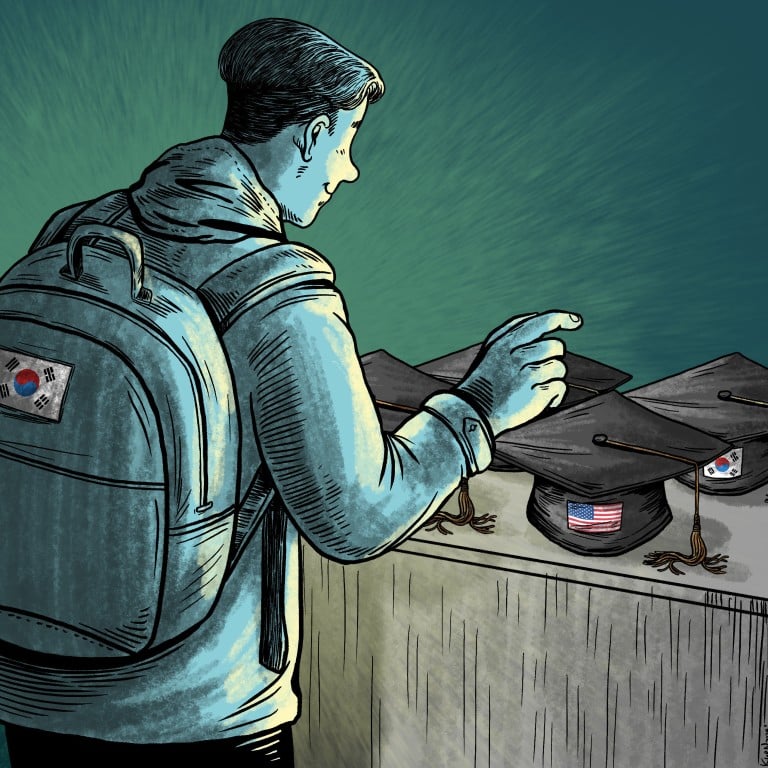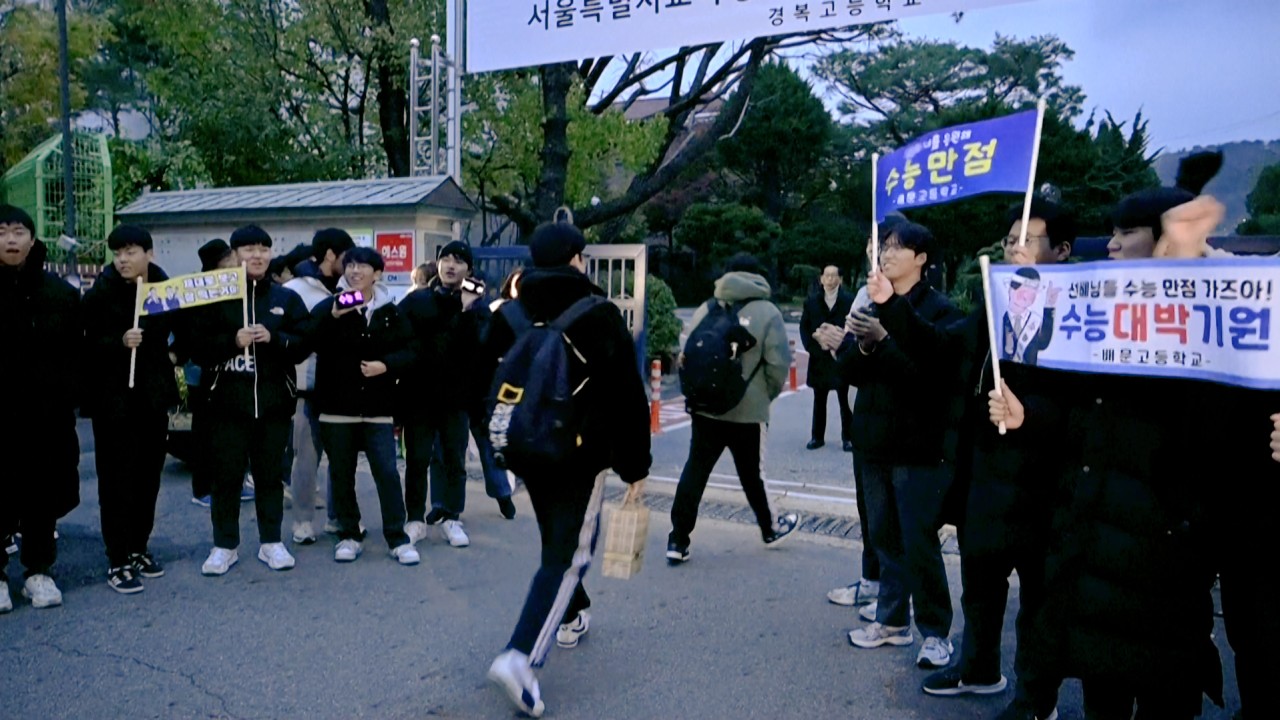
How a steep drop in South Koreans studying in China is a symptom of chill in bilateral ties
- The number of students from South Korea at Chinese universities and language institutes last year was less than a quarter of its peak of 73,240 in 2017
- Observers blame the decrease on tensions between the Asian neighbours as Seoul leans closer to US and China’s image declines among South Korean youth
“I think the general perception [of English-speaking countries] is better. Some may think they should go to those countries so they can have better academic careers,” said the 18-year-old Kim, who is applying to universities in South Korea and Canada having completing her third year of high school last year.
“It’s not just about studies. Everyday life in English-speaking countries also seems more convenient and better compared with that in China.”
According to the latest figures from Seoul’s Ministry of Education, the number of South Korean students attending universities, graduate schools and foreign language institutes in China hit a low last year, with only 15,857 as of April, compared with a peak of 73,240 in 2017.
Chinese students beat stress by turning to Southeast Asia universities
Kang Jun-young, a professor of Chinese studies at Hankuk University of Foreign Studies in Seoul, said the drop in South Korean students was fuelled by China’s declining image in South Korea.
“Parents and students judged that studying in China may not be very useful in the future as they have come to believe that China’s image in the international community is on the decline and that the rigidity of [the country’s] socialism has become relatively clear,” Kang said.
“In addition, Korea-China relations have not reached a breakthrough, so the overall favourability has fallen significantly.”
But Beijing saw US military presence at its doorstep as a threat and retaliated by imposing curbs on tourism to South Korea and slapping boycotts on South Korean retailers, pop stars and television shows.
Yoon’s predecessor, Moon Jae-in, had tried to mend ties with Beijing, but the scars remained, as did animosity towards China.
‘It’s hanbok, not hanfu’: South Korea and China clash over Olympics dress
In January, Beijing suspended visas for South Koreans travelling for business, tourism, medical treatment, transit and general private affairs, in a tit-for-tat response to what it called “South Korea’s discriminatory entry restrictions” on Chinese nationals.
Zhou Xiaolei, an associate professor at Beijing Foreign Studies University, said as the number of students dropped, China was losing an opportunity for more South Koreans to see the country for themselves, which was one of the best ways to reduce strained ties and change negative perceptions of China.
“It feels like bilateral relations, especially people-to-people exchanges, as well as public sentiment, have returned to a point before the establishment of diplomatic ties,” Zhou said.
“South Korean students in China have played a very significant role in people-to-people exchange between the two countries, and if this trend continues, in the long run, it won’t be helpful to improving bilateral ties, especially when there’s no breakthrough in political relations.”
The flow of students has long been a barometer of the strength of the bilateral relationship.
China and South Korea were enemies during the 1950-53 Korean war and remained adversaries throughout the Cold War era. But students started travelling between the countries soon after they normalised diplomatic relations in 1992. Just a few months after the normalisation of ties, the first cohort of three South Korean students, sponsored by Chinese government scholarships, arrived in China.
Bilateral relations warmed quickly, largely driven by the complementary economic relationship between the countries. South Korean conglomerates such as Samsung, Hyundai and LG wasted no time in establishing footholds in China, taking advantage of the low labour costs. This led to a rush of South Korean businesses into China stretching from the northern port city of Tianjin to Huizhou in the southern province of Guangdong.
Bilateral trade grew from US$5.03 billion in 1992 to US$362.3 billion in 2022, according to official Chinese data. In 2003, China surpassed the United States to become the biggest market for South Korean exports, while South Korea replaced Japan as China’s fourth-largest trading partner in 2022.
The trade and investment boom also sparked interest in China among South Korean students, and the number studying in the country more than quadrupled in 2017 from 16,372 in 2001..
During a state visit to South Korea in 2014, Chinese President Xi Jinping told a group of students at the prestigious Seoul National University that robust bilateral trade and exchanges showed that the two countries had “become genuine strategic partners” and bilateral relations had entered the “best period of development” in history.
College in southern China gets ‘unanimous praise’ for expelling foreign student
Uhm Jong-sik was among the thousands of South Korean students drawn by the “China rush”, having moved to the country in 2013 at the age of 14.
“At that time, my teachers and parents believed that international trade was popular and it would be quite useful to study in China and to be able to speak the Chinese language,” he said.
Uhm, now a student at Zhejiang University in eastern China, said he was well aware of the ups and downs in bilateral relations.
“The strongest hostility I felt happened during the THAAD dispute, and taxi drivers would tell me to get out if they learned that I am South Korean,” he said. “Also, when political ties worsened, mail from South Korea to China often took longer and cost more.”
“China has become less attractive [for overseas studies] because of its economic slowdown. Actually, most South Koreans don’t understand the political system of China, so disputes between us and Chinese over political topics are inevitable,” said Lee, who now works for the overseas development department of a South Korean company.
Kang, with Hankuk University of Foreign Studies, said Beijing and Seoul “must face the reality and take steps to restore trust”.
But it would not be an easy task, as China has made significant technological progress to become a competitor in global markets and was no longer just a destination for South Korean exports, according to Zhou in Beijing.
Yoon’s pro-US approach had also dimmed hopes of a quick rapprochement between Beijing and Seoul, she added.
“Hopefully the two economies can find a new balance point with new complementary cooperation in the future, and if China’s ties with the US improve, there is also hope that China’s relationship with South Korea may improve as well,” Zhou said. “But I don’t expect a major improvement in [the coming] five years.”
She said the good news was that there was still a sizeable number of Chinese students in South Korea. According to figures from the Korean Educational Development Institute, about 67,439 Chinese students were studying at South Korean higher education institutions in 2022, accounting for 40.4 per cent of all international students in the country.
Make foreign students in China pass a Mandarin test: top adviser
Lim Ji-yeon, a 21-year-old studying the Chinese language at Beijing Normal University, is trying to build goodwill between young people in the two countries by sharing her experiences online and encouraging South Koreans to visit China.
“Many of my friends in South Korea don’t have favourable impressions about China because of the political tensions and economic disputes reported by media,” said Lim, now in her third year of university.
“No matter how hard I tried to persuade them, they barely changed their minds, largely because they never experienced China.”
“Young people in South Korea love Chinese food like malatang and tanghulu,” she said, referring to a type of spicy hotpot and a traditional street food. “But they have very negative views on China, and I feel bad about it.”
Lim said she planned to bring two of her friends to Beijing next month “so that they would know that there are a lot of interesting things to do and delicious food in China”.
“Look at South Korea and Japan. We used to have very bad relations before, but recently, because many South Koreans visited Japan, bilateral relations have become much better,” she said.
Additional reporting by Fred He




